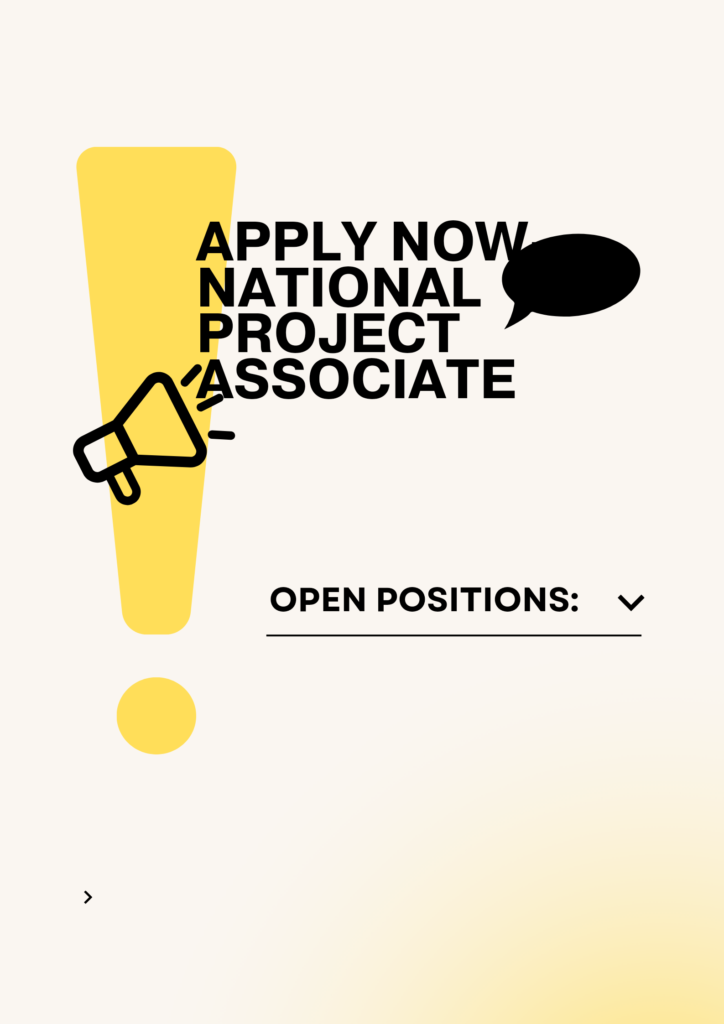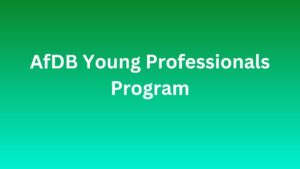TABLE OF CONTENT
Job Description for the position of a National Project Associate.
Job opening for the position of a National Project Associate.
Diversity, Equity, and Inclusion are fundamental principles at UNDP. We appreciate diversity as a reflection of the variety of nations and cultures where we operate, promote inclusion to empower all staff to contribute to our mission, and ensure equity and fairness in all our actions. Our approach of ‘leave no one behind’ in diversity efforts aims to enhance the representation of underserved populations, and individuals identifying with marginalized or excluded groups are strongly encouraged to apply. Learn more about working at UNDP, including our values and inspiring stories.
UNDP has a zero-tolerance policy for sexual exploitation and abuse, all forms of harassment (including sexual harassment), and discrimination. Selected candidates will undergo rigorous reference and background checks.
The Swiss State Secretariat for Economic Affairs (SECO) and UNDP’s Green Commodity Programme (GCP) have collaborated since 2015. Phases I and II successfully strengthened the Indonesia Sustainable Palm Oil Platform, facilitated the development and initial implementation of the National Action Plan on Sustainable Palm Oil, and supported the formulation and launch of the Coffee National Action Plan in Peru. During these phases, the UNDP GCP engaged with regional and global sustainable production initiatives, advocating for improved synergies between global buyers/traders and producer companies, refining methodologies and tools for effective multi-stakeholder collaborative action, and facilitating portfolio-wide learning and knowledge-sharing.
💬 Get Paid in Dollars Just by Chatting With Lonely People
Imagine earning daily dollar income from anywhere in the world — no degree, no experience, no interviews — just your phone or laptop.
People are getting paid simply to chat, listen, and keep others company online. This short ebook reveals:
- ✔ Legit platforms that pay in USD
- ✔ How Africans can register & withdraw successfully
- ✔ What to say to keep conversations paid
- ✔ How beginners start with zero experience
Instant download • Works worldwide • Beginner-friendly
In 2023, SECO and UNDP GCP initiated Phase III of the “Effective Collaborative Action for Sustainable Commodity Production and Trade” project. The goal is to advance multi-stakeholder collaboration for systemic change. UNDP will foster the adoption of sustainable production by facilitating effective multi-stakeholder initiatives in globally significant agricultural commodity systems across five countries.
This aims to catalyze a shared vision and collaborative action to transform these systems. UNDP will address challenges such as siloed stakeholders, mistrust, and diverging agendas, building on the successes of the prior phases. Phase III will continue work in Indonesia (Palm Oil) and Peru (Coffee), while introducing new interventions in Ghana (cocoa), Brazil (soy and beef), and Malaysia (palm oil).
Ghana is a participant in the United Nations Framework Convention on Climate Change (UNFCCC) and has made significant strides in complying with the Paris Agreement.
A noteworthy accomplishment is the progress made under Article 5 of the Paris Agreement, focusing on Reducing Emissions from Deforestation, Forest Degradation, and sustainable forest management, conservation, and enhancement of Forest Carbon stocks (REDD+), with a 25-year REDD+ Strategy in place.
Under the Forestry Commission, Ghana has identified five strategic jurisdictional programs as part of its REDD+ Strategy to address climate change. Among these, the Ghana Cocoa Forest REDD+ Programme (GCFRP) stands out as the primary emission reductions program from the REDD+ Strategy, developed by the Government of Ghana in collaboration with the Forestry Commission and Ghana Cocoa Board (COCOBOD), supported by funding from the Forest Carbon Partnership Facility (FCPF) of the World Bank. The program aims to significantly reduce carbon emissions resulting from cocoa expansion into forests while enhancing farmers’ livelihoods through climate-smart cocoa production approaches.
A significant milestone was achieved with the first results-based payment for emission reductions and removals from GCFRP for the period June-December 2019, facilitated through the FCPF of the World Bank under the Emission Reductions Purchase Agreement (ERPA).
On the ground, GCFRP implementation is organized through Hotspot Intervention Areas (HIA) within the operational region, covering Asunafo–Asutifi, Kakum, Ahafo Ano South, Atwima Mponua, Atwima Nwabiagya, Sefwi Wiawso–Bibiani, Juaboso–Bia, and Atewa. The selection of HIAs is based on factors like deforestation drivers, existing projects, capacity, population, etc., ensuring manageable landscape sizes.
The HIA promotes collaboration through a consortium of stakeholders, including private sector cocoa companies, NGOs, and government agencies. An HIA Implementation Committee oversees this collaboration, with representatives from both the HIA Management Board and the Consortium.
Sub-Landscape HIAs are established to provide localized leadership, governance, and defined boundaries within the larger HIA, facilitating effective management. The umbrella body—the HIA Landscape Management Board—comprises representatives from all Sub-HIAs.
The Effective Collaborative Action for Sustainable Commodity Production and Trade project in Ghana will integrate into the GCFRP HIA structure. This project aims to create a multi-stakeholder platform for dialogue, learning, and coordination at the sub-national level, fostering collaboration among all HIA Governance Boards and other structures. The dialogue will focus on various HIA functions, promoting information exchange, best practices, and lessons to reduce deforestation and forest degradation on a larger scale. The proposed sub-national platform aims to enhance cross-organizational efficiency, streamline governance structures, and strengthen stakeholder relationships.
The UNDP FACS Team, in collaboration with the national project team, will assist country-level interventions through informal exploratory sessions, tailored training, coaching, and ‘case clinics.’ The goal is to integrate the UNDP Effective Collaborative Action methodology into project implementation. Additionally, advisory services will be provided to align multi-stakeholder dialogues with the co-creation of technical interventions that truly impact sustainability in agricultural commodity systems.
Duties and Responsibilities of a National Project Associate:
Under the supervision of the National Project Manager, the Project Associate supports the efficient management of the project by contributing to the design, planning, execution, and monitoring of activities. The Director of the Climate Change Directorate of FC provides guidance. The Project Associate is responsible for collaborating with key stakeholders to implement activities outlined in the project’s annual work plans. The role requires independent work, leadership in processes, and adaptability to complex environments. The incumbent adheres to the principles of results-based management (RBM) and maintains a client-oriented approach in line with UNDP rules and regulations.
Required Skills and Experience
Education:
Bachelor’s degree in Project Management, Natural Resources Management or related sciences, Business, International Development, Finance, Public Administration or related fields.
Required Skills:
Familiarity with project cycle management in the public or private sector, or international organizations.
Proven comprehension of the national context.
Capability to interact with high-level stakeholders from both the public and private sector.
Proficient in MS Office.
Capability to work independently on complex tasks.
Outstanding communication, report writing, and analytical skills.
Desired additional skills and Competencies:
Relevant experience in the cocoa value chains and/or the forestry sector within the relevant commodity sector. Show a satisfactory understanding of jurisdictional REDD+. Have experience in multi-stakeholder collaboration processes. Experience with UNDP or other UN agencies is advantageous.
Required Language(s):
English and any other Ghanaian language
Professional Certificates:
Possessing any pertinent professional certificate(s) in the required competencies would be advantageous, though it is not obligatory.
Non-discrimination
The UNDP maintains a zero-tolerance policy regarding sexual exploitation, misconduct, sexual harassment, and abuse of authority. Consequently, all chosen candidates will undergo thorough reference and background checks and are expected to uphold these standards and principles.
Job Identification
Apply Before
02/16/2024, 12:59 AM
Job Schedule
Full time
Agency
UNDP
Grade
NPSA-6
Vacancy Type
National Personnel Service Agreement
Practice Area
Governance
Bureau
Regional Bureau for Africa
Contract Duration
1 Year with Possibility for extension
Education & Work Experience
Bachelor’s Degree – 3 year(s) experience
Required Languages
English and any local Ghanaian language
Note:
The United Nations does not require any fees for application, processing, training, interviewing, testing, or any other aspect of the application or recruitment process. If you receive a request for payment, please ignore it. Additionally, be aware that emblems, logos, names, and addresses can be easily copied and reproduced. Therefore, exercise caution when submitting personal information online.
Apply Now: IFC Hiring 20+ Investment Analysts Worldwide!
APPLY NOW: National Consultant – Trade Facilitation Lead in Turkmenistan
Microsoft Free Online Courses 2024 with Free Certificates
🔥 Want to Make Money Online the Right Way?
Discover how smart people are quietly earning with AI, Email Marketing, CPA, LinkedIn, Online Teaching & Content Creation.
This is not theory — it’s a step-by-step system.
👉 Get the Ebook Now












